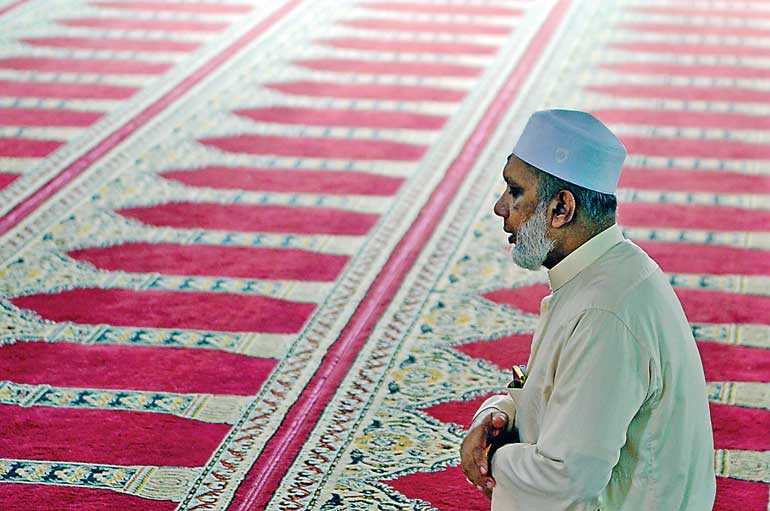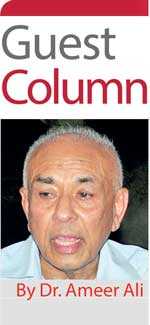Friday Feb 20, 2026
Friday Feb 20, 2026
Wednesday, 11 March 2020 01:01 - - {{hitsCtrl.values.hits}}

Without a strong and united opposition in the next parliament, minorities, particularly Muslims, will face a dark future – Pic by Shehan Gunasekara
Just as the 1956 General Election was contested and won by SWRD and his SLFP-led coalition, solely on the Sinhala Only language issue, the forthcoming one in April is also going to be fought and won by Mahinda Rajapaksa (MR) and his SLPP-led coalition, on the single issue of restoring Sinhala Buddhist supremacy. And, just as in 1956 so also in 2020 it will be members from the Buddhist clergy, who are going to be the foot soldiers in this supremacy campaign. In fact, their campaign has already started.
They are openly urging Sinhalese voters to elect only Sinhalese candidates and more importantly Sinhalese Buddhist candidates. Of course, there are exceptions like the Most Ven. Warakagoda Sri Gnanaratna Mahanayake Thera of Asgiriya Chapter, who wants laws to be passed to prevent Buddhist clergy from entering into politics. He certainly understands the dangers of politicising Buddhism in a plural society. Will anyone listen to this senior prelate with great wisdom? Advising the rulers to be virtuous in ruling is an admirable quality for Buddhist clergy, but the clergy itself trying to become rulers and king makers endangers not only the sanctity of Buddhist ‘dhamma’ but also the social esteem of the clergy. 
In all probability the 2020 election will be a landmark in the history of political Buddhism or ‘New Buddhism’ that originated in the 19th century and went on to be nurtured and promoted systematically by Sinhalese politicians since 1948. It was Anagarika Dharmapala and Ven. Walpola Rahula who sought to ensure Sinhalese Buddhist domination in Sri Lanka. “Get this right and quote me,” said Rahula in one of his interviews, “Sri Lanka is a Buddhist Sinhala country. Let no one make a mistake. Seventy percent of the country consists of Buddhists and Sinhala people. Also make this clear that Sri Lanka is the only Buddhist Sinhala country in the world.” (Quoted in Neil DeVotta and Jason Stone, “Jathika Hela Urumaya and Ethno-Religious Politics in Sri Lanka”, Pacific Affairs, vol. 81, no.1, 2008). Obviously, Dharmapala and Rahula were reacting to 450 years of Christian colonial rule over Sri Lanka. The Ceylon Citizenship Act of 1948 was the first legislative shot aimed at creating a hegemonic Sinhala Buddhist nation in a multi-ethnic and multicultural Sri Lanka. The Tamil and Muslim parliamentarians who voted for that Bill did not have a clue at that time how democracy was going to be hijacked to achieve that ultimate objective.
Latest episode of political Buddhism
The latest episode of political Buddhism was played out at the Presidential Election in November 2019. It was an election that was fought entirely on the issue of Buddhist supremacy, and GR’s victory was a victory for supremacists. Yet, with a presidency that is currently constrained constitutionally to act according to the wishes of supremacists and make Sri Lanka 100% Buddhist-ruled, that constitution has to be scrapped altogether and create a new one, or, changed radically to empower the Buddhist Sinhala president with boundless legal leverage and executive strength.
To do that a two-third majority in the next parliament is crucial. The April election will be the battle ground to fight for that objective. All other issues that are menacing the country’s economy, public welfare, foreign relations, and domestic peace will be pushed to the background during this campaign.
When Mahinda Rajapaksa made his victory speech soon after the civil war in 2009, and declared that there would be no more Sinhalese, Tamils or Muslims in future but only Sri Lankans, there was a glimmer of hope that things would change for the better. Alas! That hope was dashed when Buddhist supremacists shifted their attention from the Tamils to Muslims, and MR regime simply remained silent observers of anti-Muslim convulsions
In this political battle minority candidates in general and Muslim candidates in particular have become a class of political untouchables and liability to MR’s SLPP. In a shocking revelation, Basil Rajapaksa (BR), the chief organiser of this party, is reported to have advised two Muslim candidates from the Eastern Province who sought SLPP ticket, to contest independently or in alliance with another faction, win the race and then join SLPP to get cabinet positions. Apparently, BR had argued that those two candidates would not get even 2,000 votes if the contest under SLPP.
In actual fact, opposite is the truth. It is not those candidates, but SLPP that would earn the wrath of Buddhist supremacists and lose Buddhist votes, if Muslim candidates given SLPP endorsement. This is the extent to which supremacist ideology has overhauled the agenda and policies of SLPP. Even the UNP for that matter would prefer to go it alone without Muslim support if it could garner at least 40% of the Buddhist votes, expecting the winning votes to come from the Tamils.
To such a radical turn in the attitude towards Muslims, the behaviour of some Muslim leaders in recent past is no doubt responsible. Their public image is so maligned, the Muslim community as a whole is forced to pay a heavy price for electing those leaders in the first place. Certain other developments within the community, which I have discussed in a previous piece, also played a role.
However, in an MR-GR supremacist regime there is bound to be one or two native informers from the two minority communities who would be brought into parliament at least through the national list, and may even hold ministerial positions. But, there is no doubt that in every crucial decision to restore Buddhist supremacy and materialise Buddhist hegemony those ministers would be the first to raise their hands in support. They will simply remain as ceremonial ministers and deputies.
In the prevailing atmosphere of anti-minority sentiments and Buddhist fundamentalism, openly expressed by militant monks and their disciples, President GR has done nothing to reduce at least its virulence, let alone stopping them. His total dismissal of political power sharing with Tamils, and inaction in the face of at least three Buddhist provocations against Muslims, one in Nelundeniya, another in Chilaw and the third in Mahara, shows that he has become a prisoner of supremacists who are in control of the infamous ‘Viyathmaga’. It is unlikely that the situation would change with a new government under MR, who is also controlled by the same group.
Strong and united opposition
In this single issue contest what options do minorities have? Very limited.
To counter the dominance of supremacists and check their power and influence, one needs a strong and united opposition. At the moment, that looks a mirage given the divisions in UNP, and disunity within and between the two minorities. The UNP is so split into factions that the party has no hope of forming a government after April. (Behind this split however, is the desire of one faction in UNP that wants SLPP to win, on the understanding that the MR-GR regime would allow members of that faction go unpunished for their scandalous financial and other misdemeanour). In short, the formation of an MR-led supremacist government is unstoppable.
Ethnic politics and religious fundamentalism will reach its zenith in the coming election. From the very inception of parliamentary democracy in this country no government did ever make any attempt to build a nation of Sri Lankans. Communal exclusion was always preferred for national inclusion.
When Mahinda Rajapaksa made his victory speech soon after the civil war in 2009, and declared that there would be no more Sinhalese, Tamils or Muslims in future but only Sri Lankans, there was a glimmer of hope that things would change for the better. Alas! That hope was dashed when Buddhist supremacists shifted their attention from the Tamils to Muslims, and MR regime simply remained silent observers of anti-Muslim convulsions.
Change of regime under cunning Sirisena and incompetent Wickremesinghe after 2015 made the situation even worse. The country and its minorities have reached a dead end. At the least, without a strong and united opposition in the next parliament, minorities, particularly Muslims, will face a dark future.
(The writer is attached to the School of Business and Governance, Murdoch University, Western Australia.)